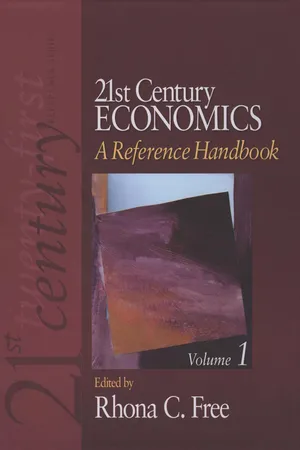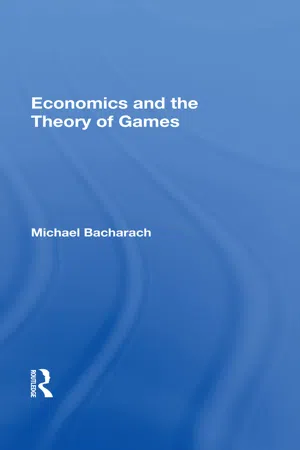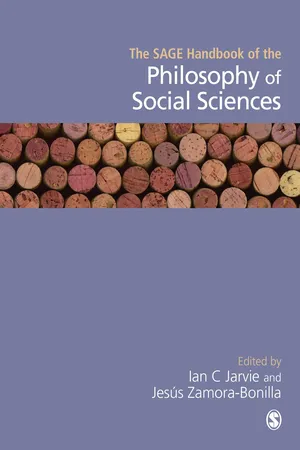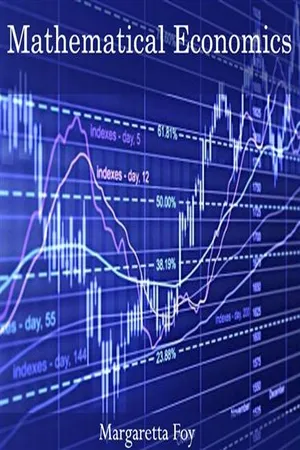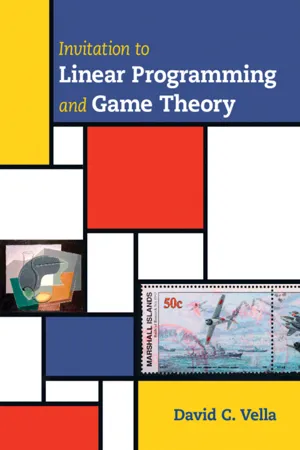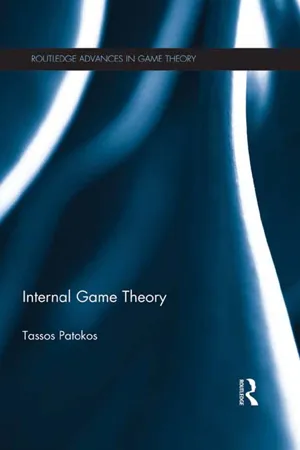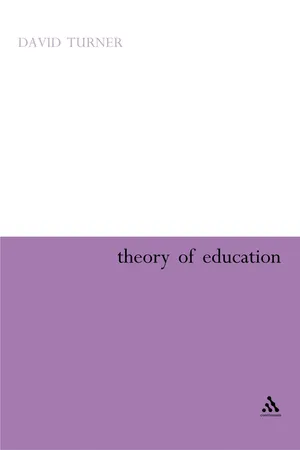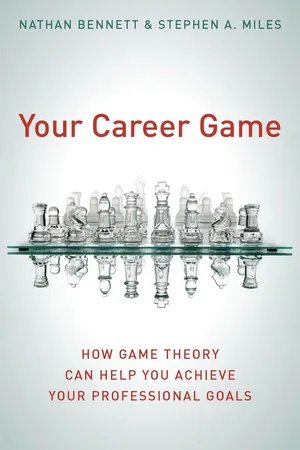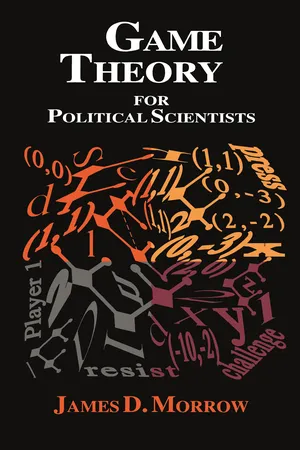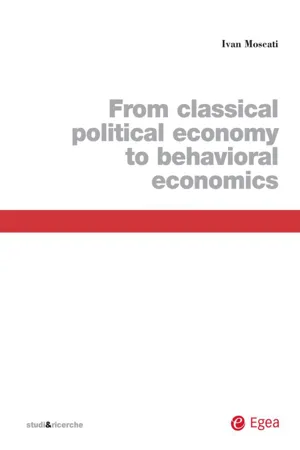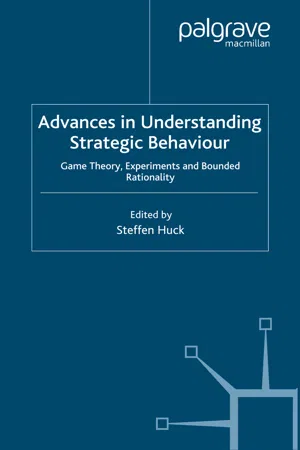Economics
Game Theory
Game theory is a mathematical framework used to study strategic interactions between rational decision-makers. It analyzes the choices and behaviors of individuals or firms in competitive situations, aiming to predict outcomes and optimal strategies. Game theory is widely applied in economics to understand and model various scenarios, such as pricing strategies, negotiations, and competition among firms.
Written by Perlego with AI-assistance
Related key terms
1 of 5
12 Key excerpts on "Game Theory"
- eBook - PDF
- Rhona C. Free(Author)
- 2010(Publication Date)
- SAGE Publications, Inc(Publisher)
17 Game Theory INDRAJIT RAY University of Birmingham G ame theory, within the discipline of economics, has perhaps been the most discussed field in the past half century—it has revolutionized the study of economics, inspired hit films, and crept into the popular awareness. The success story of Game Theory as a research area can easily be found in the advancement of field-specific journals and the many Nobel Prizes awarded to game theorists within the past two decades. As it offers powerful tools for understanding strategic interactions, Game Theory is being increasingly applied not just within economics (such as industrial organization, political economy, international trade, environmental eco-nomics) but also in other subject areas, such as politics, sociology, law, biology, and computer science. It is not sur-prising that Game Theory has gained enormous popularity and importance as a teaching module within any (under-graduate or graduate) program in economics and other related subject areas. So what exactly is Game Theory? What is a game for that matter; what makes a game, a game that's being theorized here? The answer is simple: Game Theory is nothing but an interactive decision theory involving more than one indi-vidual (decision maker). Game Theory offers mathematical models to study conflict and cooperation between intelli-gent and rational decision makers. The decision makers here are called the players. These players are assumed to be intelligent and rational in the sense that they can identify their own objectives and can choose the best among a set of alternatives by comparing outcomes and performing necessary calculations. There are many real-life examples of games—board games such as chess and checkers are games that are the-orized. However, many televised game shows are not games as they do not involve interactive decision mak-ing. Indeed, many real-life situations can be modeled and analyzed using Game Theory. - eBook - PDF
- Michael Bacharach(Author)
- 2019(Publication Date)
- CRC Press(Publisher)
Game Theory is the theory of what a player should do. Its object is not to explain how people do play games, but to identify individuals' Introduction: The Theory of Games and Economic Theory 3 optimal actions in the face of interdependence. It is that part of the theory of rational decision in which the number of rational agents is greater than one and their problems cannot be disentangled. 1.2 ECONOMICS WITHOUT Game Theory It is possible to see much of economic theory as a theory of rational choice. This is most explicit in neoclassical microeconomics. There, homo economicus spends his waking hours making cool and calculated decisions designed to bring about the top outcome of a set of possible outcomes which are arranged in a clear order of preference. This maximising or optimising behaviour is then taken by the neoclassical theorist as a first approximation in describing real behaviour. Such a derivation of 'is' from 'ought' by the use of an ideal type of rational behaviour as approximate description is typical of neoclassical methodology. It has often been made with a hair-raising lack of precaution, but there are circumstances in which it is a quite sensible way to start. We shall refer to this device as the 'normative-to-descriptive step'. Keynesian macroeconomics appears at first sight to be of an opposite character. It sets out to describe, in aggregated form, the actual reactions of economic agents, however irrational these may be, 'warts and all'. Here we find money illusion, non-adaptive expectations, inflexible consumption habits. Yet even here there are, increasingly, attempts to rationalise the apparently irrational, to explain observed behaviour in terms of latent individual optimising choices. These attempts are made by Keynesians as well as neoclassicals. - Ian C Jarvie, Jesus Zamora-Bonilla, Ian C Jarvie, Jesus Zamora-Bonilla, Author(Authors)
- 2011(Publication Date)
- SAGE Publications Ltd(Publisher)
Game Theory G i a c o m o B o n a n n o 15 INTRODUCTION Game Theory is a branch of mathematics that deals with interactive decision-making, that is, with situations where two or more indi-viduals (called players ) make decisions that affect each other. 1 Since the final outcome depends on the actions taken by all the play-ers, it becomes necessary for each player to try to predict the choices of his opponents, while realizing that they are simultaneously trying to put themselves in his shoes to figure out what he will do. The birth of Game Theory is usually associ-ated with the publication in 1944 of the book Theory of Games and Economic Behavior by the mathematician John von Neumann and the economist Oskar Morgenstern, although important results had been obtained earlier. 2 Applications of Game Theory can be found in many fields, most notably biology, computer science, economics, 3 military science, political science, and sociology. Game Theory has been traditionally divided into two branches: non-cooperative and coop-erative. Cooperative Game Theory deals with situations where there are institutions that make agreements among the players binding. In such a setting the central question becomes one of agreeing on a best joint course of action, where ‘best’ could have different meanings, such as ‘acceptable to all players and coalitions of players’ 4 or ‘satisfying some desirable properties’. 5 Non-cooperative Game Theory, on the other hand, deals with institutional settings where binding agree-ments are not possible, whether it is because communication is impossible or because agreements are illegal 6 or because there is no authority that can enforce compliance. 7 Because of space limitations we shall deal exclusively with non-cooperative games. Our focus will be on the philosophical and episte-mological issues that arise in non-cooperative games, in particular on the notion of rational-ity and mutual recognition of rationality.- No longer available |Learn more
- (Author)
- 2014(Publication Date)
- Orange Apple(Publisher)
Game theoretic arguments of this type can be found as far back as Plato. Economics and business Economists have long used Game Theory to analyze a wide array of economic phenomena, including auctions, bargaining, duopolies, fair division, oligopolies, social network formation, and voting systems and to model across such broad classifications as behavioral economics and industrial organization. This research usually focuses on particular sets of strategies known as equilibria in games. These solution concepts are usually based on what is required by norms of rationality. In non-cooperative games, the most famous of these is the Nash equilibrium. A set of strategies is a Nash equilibrium if each represents a best response to the other strategies. So, if all the players are playing the strategies in a Nash equilibrium, they have no unilateral incentive to deviate, since their strategy is the best they can do given what others are doing. The payoffs of the game are generally taken to represent the utility of individual players. Often in modeling situations the payoffs represent money, which presumably corresponds to an individual's utility. This assumption, however, can be faulty. ____________________ WORLD TECHNOLOGIES ____________________ A prototypical paper on Game Theory in economics begins by presenting a game that is an abstraction of some particular economic situation. One or more solution concepts are chosen, and the author demonstrates which strategy sets in the presented game are equilibria of the appropriate type. Naturally one might wonder to what use should this information be put. Economists and business professors suggest two primary uses: descriptive and prescriptive . Political science The application of Game Theory to political science is focused in the overlapping areas of fair division, political economy, public choice, war bargaining, positive political theory, and social choice theory. - David C. Vella(Author)
- 2021(Publication Date)
- Cambridge University Press(Publisher)
6 Game Theory 6.1 Introduction The reader may have heard that Game Theory is a mathematical analysis of strategic behavior; and may know that it has found important applications in many fields of study such as warfare, politics, diplomacy, biology, and especially economics. The theory continues to find new applications, and moreover, it has captured the public imagination in a way that is unusual for mathematics. One of the high-water marks of the theory’s public appreciation occurred in 1994, when John F. Nash (later the subject of the biographical book and movie A Beautiful Mind), John C. Harsanyi, and Reinhard Selten were awarded the Nobel Prize in Economics for their work in Game Theory. To quote from the 1994 press release from the Royal Swedish Academy of Sciences: The foundations for using Game Theory in economics were introduced in a monumental study by John von Neumann and Oskar Morgenstern entitled The Theory of Games and Economic Behavior (1944). Today, 50 years later, Game Theory has become a dominant tool for analyzing economic issues. In particular, non- cooperative Game Theory, i.e., the branch of Game Theory which excluded binding agreements, had had a great impact on economic research. The principal aspect of this theory is the concept of an equilibrium, which is used to make predictions about the outcome of strategic interaction. John F. Nash, Reinhard Selten, and John C. Harsanyi are three researchers who have made eminent contributions to this type of equilibrium analysis. In fact, the reader may find it instructive to read the entire press release, which can be found at the following website: www.nobelprize.org/prizes/economic-sciences/1994/press-release/ But what exactly is meant by “analysis of strategic behavior,” and what does this have to do with games? The concept of a mathematical game is different from and more general than the usual notion of a parlor game, such as chess, Monopoly, poker, or ticktacktoe.- eBook - ePub
- Tassos Patokos(Author)
- 2013(Publication Date)
- Routledge(Publisher)
4 A critical overview of Game Theory4.1 The premises of conventional Game TheoryIn the second chapter, we saw that, according to mainstream economic theory, the rational agent tries to maximise his or her utility, subject to physical, budgetary or institutional constraints. When there are multiple agents who try to do the same thing, someone's quest for utility maximisation might get in the way of someone else's effort to maximise his or her own utility. In other words, the utility consequences of someone's choice might depend on the action chosen by somebody else. Game Theory is a theoretical framework that applies to exactly these kinds of situations where agents interact with each other, and where each one of them has to take into account the presence of other agents — contrary to individual choice theory, where the focus is placed on the standalone agent who, despite his or her possibilities for trade, essentially operates on his or her own.To define a game we need three things: a set of players, a set of available strategies per player, and each player's utility (or payoffs) from each possible combination of strategies chosen by all the players. A good introductory example would be what is Game Theory's most famous game, the so-called ‘Prisoners' Dilemma’; what follows is a common variation of the story associated with this game.Assume that Anne and Bill are held imprisoned for an illegal deed they committed together. Although the judge is absolutely convinced that they are guilty, there is not enough evidence for a case against them. The judge visits Anne and Bill in their (separate) cells, and informs them that they have a choice between confessing and not confessing. If the one confesses and the other does not, then the person who did not confess will spend 10 years in prison (now that there will be a case against him or her), and the person who confessed will receive a monetary reward for helping the authorities and all charges against him or her shall be dropped. If they both confess, then they will both spend 5 years in prison (reduced from 10, because they both cooperated with the authorities). If neither confesses, then there can be no case, and both will be released. While it would perhaps make sense to foresee that, under these rules, nobody will confess and both Anne and Bill will walk away from prison, this is not what Game Theory predicts: on the contrary, it suggests that both prisoners will confess, and hence, they will spend 5 years in prison each. - eBook - PDF
- David A. Turner(Author)
- 2005(Publication Date)
- Continuum(Publisher)
Game Theory has also been applied to other real life situations of extreme seriousness, such as decisions of strategy in war, in labour negotiations and in micro-economics. The word 'game', then, is not intended to imply something frivolous. 81 THEORY OF EDUCATION The pay off matrix shows the gain for player A; a gain for A is a loss for B 82 Baseball is not in the game theoretical sense a game, although Game Theory has been applied to various aspects of it, as when the managers of both sides have to decide whether to choose a left-handed or a right-handed pitcher and left-handed or a right-handed batter. This is an important distinction because it means that what is being sought in the analysis of baseball is not that Game Theory is true, nor that it accurately describes some aspect of the game of baseball, but that Game Theory can be used to make sense out of the options which face a manager in making particular choices. Two Person Zero Sum Games The archetypical game in Game Theory can be relatively easily understood by considering a game known as 'Mora'. 'Mora' involves two players, each of whom has to make a decision in ignorance of the decision of the other. Each of them holds out either one or two fingers under the table, so that the other player cannot see. The two players then simultaneously reveal their fingers to show how many they have extended. If the total number of fingers extended is odd, player A wins; and if the total number of fingers is even, player B wins. Supposing that they play for a simple stake, where whoever loses pays the other a penny, then we can describe the outcomes in a simple pay off matrix as shown below. Figure 6.1: Simple pay-off matrix for a zero-sum game. Game Theory AND INDIVIDUAL CHOICE IN SCHOOLING Here the reasoning is rather different because player A has one outcome which is very much preferable to the others. - eBook - PDF
Your Career Game
How Game Theory Can Help You Achieve Your Professional Goals
- Nathan Bennett, Stephen A. MIles(Authors)
- 2010(Publication Date)
- Stanford Business Books(Publisher)
2 Nobel prize–winner and Game Theory pioneer Reinhard Selten observed that people work diligently to be rational ex post . That is, we commonly look back at how a situation played out to try and understand how a better outcome might have been achieved. This contrasts with a Game Theory approach in which the goal is to develop a strategy that will lead to that better outcome a priori . Recognizing your interdependencies with other individuals is key in terms of developing an effective strategy. Your ability to achieve a desired out-come based on a decision is consequently dependent on your insight regard-ing the likely decisions and reactions of others. You can improve your ability to understand others’ actions and reactions by explicitly recognizing the inter-dependence among parties and by making use of a host of concepts developed by game theorists. As a result, you can make better decisions. Our purpose in this chapter is to introduce and discuss the key Game Theory concepts that will be useful in understanding your career as a game. We begin with an introduction to different types of games and a discussion of how the type of game that you play impacts your strategy. Next, we review the most important Game Theory concepts and their roles in the career game. Finally, we draw on work by John McMillan on Game Theory and business strategy to present and discuss the critical questions that players need to address in order to frame their career games. Answering these questions appropriately will al-low you to understand the rules, players, boundaries, and time constraints of the game you are setting out to play. understanding fundamental Game Theory concepts Begin with the end in mind. Stephen Covey, The 7 Habits of Highly Effective People 34 chapter two understanding the game Game theorists have developed a nomenclature that describes central compo-nents of the theory and its application. - John Hoag(Author)
- 2007(Publication Date)
- WSPC(Publisher)
Section XI Game Theory a One problem we have not discussed is what happens when firms or consumers interact. The models we have examined above are models where there is no inter-action among the economic actors. That is, the actions of one firm did not affect the actions of another firm. This seems a bit unrealistic and not very descriptive. However, there is a strength in the analysis we did earlier. That analysis provided a unified framework, namely the maximization hypothesis, for looking at the behav-ior of both the consumer and the producer. The framework also provided testable hypotheses concerning their behavior and for both demand and supply. The maximizing technique is also important in Game Theory. The techniques and basic ideas we have so far developed will be extended in what follows. That is, we will continue to assume that the firms are profit maximizers. Up to this time, the profit expression was only dependent on parameters (prices and technology) not under the control of any one firm. In one way we could think of our prior models of the firm as a game against nature where nature determined the prices. Thus as we proceed in Game Theory, the basic approach to the firm’s problem is maintained. A second strength of Game Theory is that we can bring in a variety of alternative behaviors that were not possible to consider in the prior framework. A weakness is that we no longer focus on supply and price determination as we did before. The problem is that supply, as we thought about it before, now no longer makes sense. The quantity a firm supplies depends on what the other firms are doing and is no longer well defined. Price determination becomes a more complicated process. Before starting the discussion of Game Theory, a few words of history and general overview might be helpful.- eBook - PDF
- James D. Morrow(Author)
- 2020(Publication Date)
- Princeton University Press(Publisher)
The individuals can be persons or collective entities that make consistent choices. Individuals' choices are also shaped by their social settings, which social scientists often call structure. Structure ranges from the factors that pro-duce the consequences of decisions, such as military capabilities in interna-tional politics, to whether people even believe that they have choices. Game Theory provides a way to formalize social structures and examine the effects of structure on individual decisions. To specify the structure of a game, we must specify what choices the players face, how those choices lead to outcomes, and how the actors evaluate those outcomes. Those choices of game structure cap-ture different social theories. If one of the themes of this book is that individual choices depend upon the choices of others, how the choice of game structure captures competing social theories is the second theme. Game Theory cannot tell us whether certain theories are accurate descriptions of the world, but it can tell us what behavior we should expect as a consequence of those theories. CHAPTER ONE Game Theory can model economic, political, or more general social situa-tions. Economic situations include markets where the choices of many affect prices for all, oligopolistic competition where the marketing decisions of a few firms affect prices, and bargaining between two or more buyers and sellers. Po-litical situations could be electoral competition among candidates, legislative voting in committees, and international bargaining in world politics. Social sit-uations cover the range of group interactions in different settings. This book focuses on political settings as illustrations because it is written for political scientists. However, the techniques described are relevant for a broad range of social interactions. - Ivan Moscati(Author)
- 2013(Publication Date)
- Egea(Publisher)
This approach to Game Theory is called evolutionary Game Theory and its main distinctive feature is that in it considerations about the players’ rationality play only a marginal role. To conclude this section on Nash, it is interesting to note how von Neumann reacted to Nash’s Game Theory. According to the testimony of Princeton’s game theorist Martin Shubik, as collected by Leonard: Von Neumann “hated it!” [i.e. the Nash equilibrium], clearly finding it foreign to his whole conception of Game Theory. He was opposed to ruling out communication among the players and opposed to the search for a single-point solution. Von Neumann stood by the stable set which, while it sacrificed precision, implicitly allowed for the effect of extra-theoretical influences i.e., social norms […]. Nash himself recalls that when he first presented his idea to von Neumann, the latter was not only dismissive but was able to pre-empt Nash's theory in the course of their conversation (Leonard 1994, p. 503). 3 Schelling, Selten, and Harsany: their contributions to Game Theory 4 Despite its usefulness, there are problems associated with the concept of Nash equilibrium. In the 1960s, Thomas Schelling, Reinhard Selten and John Harsanyi attempted to solve some of these problems. Here we briefly outline their contributions to Game Theory. 3.1 Schelling on coordination and focal points In his first book, The strategy of conflict (1960), Thomas Schelling (born in 1921; 2005 Nobel Prize in economics «for having enhanced our understanding of conflict and cooperation through game-theory analysis») focused on non- zero-sum games in which the players have a mutual interest in coordinating their behaviors but, for some reasons, are not willing to or cannot communicate. Thus they face a coordination problem, whose solution 4 On the topics in this section see: Gul 1997; Dixit 2006; Kuran 2008, Myerson 2008; Nobelprize.org 1994; van Damme and Weibull 1995.- eBook - PDF
Advances in Understanding Strategic Behaviour
Game Theory, Experiments and Bounded Rationality
- S. Huck(Author)
- 2004(Publication Date)
- Palgrave Macmillan(Publisher)
2 While it may well be true that human subjects do not behave according to these solutions in many situations, few experi- ments actually provide evidence for this. Especially in the early literature, ∗ This chapter is a major revision of SSE WP 382 of May 2000. I am grateful for helpful comments from Ana Ania, Geir Asheim, Kaushik Basu, Larry Blume, Vincent Craw- ford, Martin Dufwenberg, David Easley, Tore Ellingsen, Ernst Fehr, Jean-Michel Grandmont, Thorsten Hens, Jens Josephson, Donzhe Li, Sendhil Mullainathan, Rosemarie Nagel, Al Roth, Maria Saez-Marti, Larry Samuelson, Martin Shubik, Jon- Thor Sturlason, Sylvain Sorin, Fernando Vega-Redondo and Shmuel Zamir, and to seminar participants at presentation of various drafts of the chapter. 85 86 Testing Game Theory experimentalists did not make any effort to elicit the subjects’ preferences, despite the fact that these preferences constitute an integral part of the very definition of a game. Instead, it has been customary simply to assume that subjects care only about their own material gains and losses. In later studies, subjects’ preferences were allowed also to depend on the ‘fairness’ of the resulting vector of material gains and losses to all subjects. However, recent experiments, discussed below, suggest that even this is sometimes too restrictive – subjects’ ranking of alternatives may depend on other parts of the game form, a phenomenon here called ‘context dependence’. In applications of non-cooperative Game Theory, the game is not only meant to represent the strategic interaction as viewed by the analyst, but also as viewed by the players – it is even assumed quite frequently that the game is common knowledge to the players. Indeed, a variety of epistemic models have been built in order to analyse the rationality and knowledge assumptions involved in game-theoretic analysis – under the classical inter- pretation that the game in question is played exactly once by rational players.
Index pages curate the most relevant extracts from our library of academic textbooks. They’ve been created using an in-house natural language model (NLM), each adding context and meaning to key research topics.
